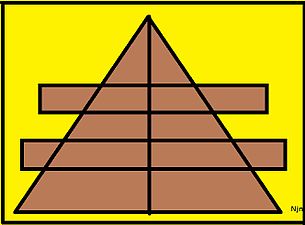Lambs and tigers
 Three variations of empty grids on which this game can be played | |
| Genres | Board game Leopard hunt game |
|---|---|
| Players | 2 |
| Setup time | < 1 min |
| Playing time | < 1 hour |
| Chance | None |
| Skills | Strategy |
| Synonyms | Aadu Puli aatam or Pulijudam |
Lambs and Tigers Game locally referred as Aadu Puli aatam (Tamil: ஆடுபுலி ஆட்டம், Game of goats and tigers) or Pulijudam is a strategic, two-player (or 2 teams) leopard hunt game that is played in south India. The game is asymmetric in that one player controls three tigers and the other player controls up to 15 lambs/goats. The tigers 'hunt' the goats while the goats attempt to block the tigers' movements. This has been the most ancient game.
General gameplay

At the start of the game all the 3 Pulis (tigers) are placed on the apex, and 2 inner places closest to the apex. All aadus (goats) start off the board.
The pieces must be put at the intersect of the board lines and moves follow these lines.
The player controlling the aadus' moves first by placing an aadu onto a free intersection on the board. Then it is the puli's turn. One puli is then moved to an adjacent position along the lines that indicate the valid moves. Moves alternate between players.
A puli captures an aadu by jumping over it to an adjacent free position (as in checkers). Aadus can not move until all 15 have been put on the board.
The pulis must move according to these rules:
- They can start capturing aadus any moment after the match has started.
- They can capture only one aadu at a time.
- They can jump over a goat in any direction, but it must be to an adjacent intersection following any of the lines drawn on the board.
- A Puli cannot jump over another Puli.
The Aadus must move according to these rules:
- They must leave the board when captured.
- They can not jump over the Pulis or other aadus.
- They can only move after all 15 have been put on the board.
Puli wins if all the aadus are captured. Aadu wins if all Pulis are blocked from movement.
Equipment
Aadu: 15 small pieces. Puli: 3 big pieces. Board with lines. And 23 Spots for moving Aadu and Pulis.and to cut them
Object
Aadu's objective is to encircle Pulis so that none of the Pulis can move. Puli's objective is to kill All Aadus.
Trivia
- This is the ancient game played in southern part of India especially in the state called Tamil Nadu.
- The board is drawn on parapet inside the mahadwara of the Chamundeshwari temple atop Chamundi Betta (hill) in Mysore, Karnataka
- This game helps people to develop strategy and concept of teamwork by teaching that even though weak, if united, one can vanquish the stronger enemy as a team.
Names
- Puli-Meka / Puli Joodamu (Tiger Gambling) - Telugu
- Huli Ghatta or Adu Huli - Kanada
Gallery
-
Game type -1
-
Game type -2
-
Game type -3



